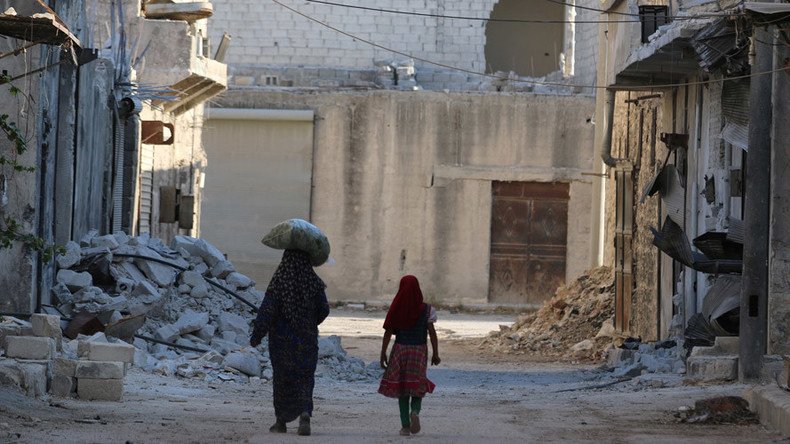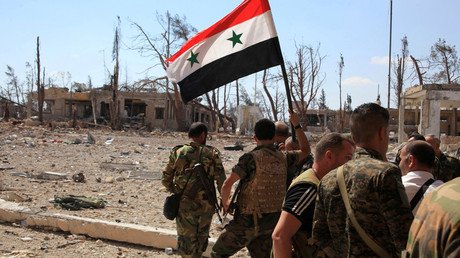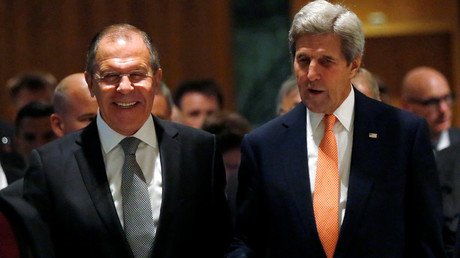Russia & US-brokered Syria ceasefire coming into force, 48hr pause to start at sunset

The landmark new Syrian ceasefire plan, brokered in Geneva by Russian Foreign Minister Sergey Lavrov and his US counterpart, John Kerry, is set to start on Monday evening. It will initiate an initial 48-hour truce, which must then hold for the entire week.
The truce is to see the nationwide halt of Syrian government military action against rebels as well as cooperation on strikes against terrorist targets. The agreement also envisions a halt to offensives by the rebel forces in Syria and their separation from terrorist groups.
Kerry previously said that the ceasefire comes into effect “at sundown” on September 12, Damascus time.
According to the deal extremist organizations such as Islamic State (IS, formerly known as ISIS/ ISIL) or Fateh al-Sham (Formerly Jabhat Al-Nusra) are excluded from the cessation of violence and will be subjected to further attacks.
In case the ceasefire holds for at least a week Moscow and Washington would also establish the Russian-US Joint Implementation Centre (JIG) that would serve the purpose of “delineation of territories controlled by Al-Nusra and opposition groups in the area of active hostilities."
The 48-hours nationwide ceasefire is the first step of a proposed seven day truce and is part of a greater peace plan agreed on between Moscow and Washington. Another key element of it is the supplying of aid to the civilian population, particularly in the embattled city of Aleppo.
The announcement of the deal followed marathon talks in Geneva that started Friday morning and lasted over 13 hours. Kerry has called “on every Syrian stakeholder to support the plan that the United States and Russia have reached” to aid the peace process in Syria.
Following the talks EU officials, along with Turkey, welcomed the outcome as a step towards reconciliation that could end years of violence.
The European Union’s top diplomat, Federica Mogherini also called on “all parties to the conflict, other than groups designated as terrorist organizations by the United Nations Security Council [UNSC]” to stick to the agreement.
Russia has guaranteed the compliance of Syrian authorities with the terms of the agreement. Lavrov has announced that Syria’s leadership is ready to implement the agreements in full.
However he noted that some parts of rebel forces have been refusing to cooperate in the peace process, instead disrupting Russia’s efforts to supply humanitarian aid to Aleppo by threatening its convoys.
Washington also called on so-called moderate rebels, parts of which are backed by the US to stick to the deal.
However it added that the groups had a “right for self-defense” in case of violations of the agreement by the Syrian government.
Russia and the US also outlined the establishment of the Russian-US Joint Implementation Centre (JIG) that would serve the purpose of the “delineation of territories controlled by Al-Nusra and opposition groups in the area of active hostilities."
Lavrov has also confirmed that Russia and the US had agreed to coordinate airstrikes in Syria, “provided there is a sustained period of reduced violence.”
Earlier on Sunday, Ahrar al-Sham, which was formerly a party to the previous ceasefire deal brokered by the US and Russia in February, apparently rejected the new agreement.
In a video address published on YouTube, the group’s deputy leader Ali al-Omar denounced the truce as a “half-solution” which would “only serve to reinforce the regime and surround the revolution[ary] military.”
Speaking on behalf of the hardline militant group, Omar also reportedly refused to cease ties with Fateh al-Sham, previously known as Al-Nusra Front. The separation of the so-called moderate opposition from Al-Nusra is one of the key elements of the deal.
Russia has for long demanded the exclusion of Ahrar al-Sham from talks in Geneva and the designation of the group as terrorist, citing multiple violations of ceasefire, attacks on civilians as well as alleged use of chemical weapons. In July, the group’s militants shelled a UN humanitarian convoy near Damascus, while in February it claimed responsibility for a car bomb attack attempt at what it said was a Russian military base.














